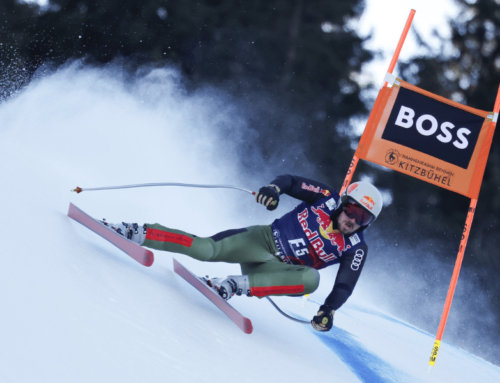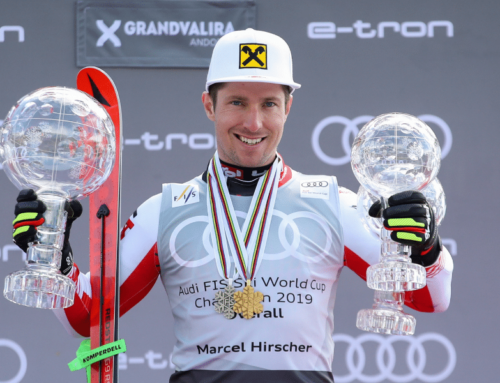The Education of American Ski Racing
At this year’s Birds of Prey World Cup giant slalom, the finish area was awash in a sea of green jackets, emblazoned with the iconic Dartmouth Ski Team snowflake. The teammates had come out to cheer on Dartmouth alums Tommy Ford and Brian McLaughlin. Ford, in his 12th year on the U.S. Ski Team, attended Dartmouth as many national team skiers have—by patching together terms opportunistically during injuries and off-season breaks. McLaughlin, who graduated from Dartmouth in 2018 as NCAA GS Champion, is the latest in a trend of skiers who attended college full-time while racing on the NCAA circuit, and emerged with the skills, maturity and ranking to move on to the World Cup. The man who has been perhaps most instrumental in creating an environment where such success can happen, especially for American athletes, is Dartmouth Men’s Team coach since 1990, Peter Dodge. Looking at his own path in ski racing helps explain his motivation.
Dodge and his older brother Dave grew up in St. Johnsbury, Vermont, in the heart of Vermont’s Northeast Kingdom, where, as he recalls, “every little town had a rope tow.” Their father, Dave “Duffy” Dodge, an interstate highway builder who had ski raced for the University of Vermont, taught the boys how to ski under the lights on the rope tows of the Lyndon Outing Club. “Skiing” also included cross-country skiing and jumping. On weekdays after school the boys would join the Murphy family, and climb the hill behind the Murphy’s hotel. They hauled a few saplings along and used them as slalom gates. On weekends, when they got older, they’d go to the “big mountain” at Burke.
Racing in that corner of the northern Vermont council was a down-to-earth affair. On the way to a race in tonier Stowe, the youngest Dodge remembers mentioning to his Dad that the Stowe kids were “a bit stuck up.” Duffy gave his son no-nonsense advice: “Beat them and they’ll be your friends.“ Dodge did just that, and fondly remembers being in a mass snowball fight that same afternoon with his new friends. Soon Dodge’s skiing skills would take him well beyond the Kingdom.
Dodge worked his way up the skiing ranks, attending regional camps and national competitions while attending public high school at St. Johnsbury Academy. Meanwhile, the Murphys helped entice Warren Witherell to come to Burke, where he started Burke Mountain Academy in 1970. Burke coaches Witherell and Chris Jones as well as Eastern Regional coach George Ostler helped Dodge progress and by the time he graduated from high school in 1973, he was on the National Development Team.
After one gap year, Dodge started Dartmouth in the fall of 1974. He took the winter off, won the 1975 Can-Am title, and spent the next year on the U.S. Ski Team before being dropped. From here, Dodge struggles to piece together his sporadic U.S. Ski Team years, but he clearly remembers the pivotal moments that shaped his career.
THE EPIPHANIES
After winning the early season races in December 1976, Dodge was offered and declined a spot on the D team, with far less accomplished athletes. That was when he had his first epiphany. “I was sitting in the parking lot of my brother’s fraternity on Christmas Day, and it was about 60 degrees. I remember thinking ‘I know I can ski better than this,’” With Redneck Racing-like spirit, he decided right then to go to Europe on his own. He recruited Bill Doble as his service man and Swiss native Butch Rickenbach—then a student at Burke Mountain Academy—as his coach. Finally, he convinced his parents into buying a Peugeot for European delivery so they would have a car to use. After a month together, and strong results, the trio broke up and Dodge joined a Europa Cup Tour (paid for by the Europa Cup) through Czechoslovakia and Poland. The entire tour of 15 nationalities literally piled (ski bags in the aisle) into a Russian airplane in Zurich then traveled around by bus. “It was super fun,” recalls Dodge, whose results earned him a spot on the U.S. B Team, where he competed for the next two seasons.
Despite finishing 1979 with two top-15 World Cup finishes in Stratton and Waterville Valley, when Bill Marolt tracked him down by phone at his brother’s condo in Burlington that spring, it was to kick him off the team. That was when he had his second epiphany. “It was the same story as before. I put down the phone—click—and said, ‘I just turned pro!’” Dodge recalls with a laugh.
That experience helps Dodge relate to the athletes who come to Dartmouth with unfinished business. “After two years on the Team, I knew I could ski better. I just wanted to go out and ski, for me, the way I knew how to ski. It was just really clear.” As with so many American and international skiing stars in that era, he found the World Pro Tour fun and liberating. “The beauty of the pro tour was there were no politics: You show up, and go fast.” Dodge found immediate success, winning Rookie of the Year in 1980. After nine years on the World Pro Tour, he retired from Pro Racing in 1989 and went to work for his long time supporter CB Vaughan at CB Sports. As he was looking to go back to school to finish his degree, the Dartmouth Ski Coach job came up. Dodge took the position over from Mark Ford, who had been on that same Europa Cup bus tour that launched Dodge’s international success, and whose son is the aforementioned Tommy, currently America’s top giant slalom skier.
COLLEGE RACING’S COMEBACK
At Dartmouth, Dodge took over a big piece of skiing history and built on the tradition. He has presided over an era that saw NCAA racing move from a step-down program for elite junior racers, to a highly competitive arena where top athletes toggle between the World Cup and the carnival circuit, and often continue their athletic careers after graduation. In many respects, it has returned college racing to its roots and relevance. “Ski racing in the U.S. was originally born out of college outing clubs,” explains Dodge. Chief among them was the Dartmouth Outing Club, which organized the first Winter Carnival in 1911. Until Bob Beattie organized a U.S. Ski Team in the 60’s, Olympic ski teams were chosen from the college rosters. As the U.S. Ski Team grew, college racing became less relevant for development, though some athletes—like Dave Currier, Dodge and Tiger Shaw—were able to work Dartmouth’s flexible D-Plan around their competition schedules.
Shortly after Dodge took over, college coaches in the west, including Richard Rokos at Colorado and George Brooks at the University of New Mexico, took the lead from the World University Games and held some FIS sanctioned University (FIS UNI) races. Dodge, who was president of the Eastern Intercollegiate Ski Association (EISA), saw the opportunity in that, and eventually Dartmouth hosted the first official EISA FIS UNI race in 1995. “That changed things,” he explains. In a push to make the tour better, FIS UNI races were phased in to become the norm.
As FIS level racing legitimized the circuit, and the level came up, NCAA Champions—from the U.S. and other countries— started moving on to their national teams after college. NCAA Titles earned U.S. Ski Team berths for Dartmouth skiers Andy Martin, Roger Brown, and Karl Johnson. By the time David Chodounsky, a last minute recruit, started Dartmouth in 2004, the team was “stacked,” he recalls. (Dartmouth men won the NCAA slalom title for five years straight from 2002-2006.) “I was not the top guy but I knew I was going on to a good team.” It was also a close, hard-working and fun-loving team. Dartmouth’s all-American squad won the NCAA Championships in 2007. “Peter never pressured us to finish,” says Chodounsky. “He told us you have to go for it if you want to win.” He’d also remind his athletes: “Someone’s got to win today. It might as well be you!”
By Chodounsky’s senior year he was invited to compete on the Europa Cup with the U.S. Ski Team. As is his policy, Dodge fully encouraged the opportunity for higher-level competition, even though it meant missing two carnivals. Chodounsky graduated in four years with a double major in Engineering and Earth Science and went on to become the top American slalom skier, spending nine years on the U.S. Ski Team and competing in two Olympics.
THE DARTMOUTH EXPERIENCE
Chodounsky’s success not only made him the poster child for the Dartmouth Experience, but also triggered a shift in perception. College racing, for some athletes, can not only be a path for elite development, but also the preferred path; that four years in a stable, social, intellectually stimulating team structure can be an ideal environment for discovering true potential. “Dartmouth is all about excellence in academics, conduct, standards… having a good experience for athletes,” says Dodge. “Winning is fun, but it’s not all that it’s about. We’re preparing them for life.”
That starts by creating a supportive team atmosphere, which is not a mere consequence of a team sport. “We really work on it,” says Dodge, who, in addition to being very well-organized, encourages athletes to help coach each other. “When you coach you improve your own skiing,” Dodge explains. That means standing on the hill and watching, supporting each other after a bad run, watching video together, talking about equipment, and sharing information. “It comes down to my coaching philosophy,” Dodge explains. “Encourage what you see.” He likens it to an artist bringing out what is in the stone. “When you do something well, I’m not going to tell you what you did; I’m going to find a way to let that happen again.” Off the hill, kids get socialized in an environment that is riddled with challenges, but is accepting. Dodge, who bristles at the concept of hazing, encourages incoming athletes to be leaders from the start. “I tell them there is no seniority or hierarchy here. Learn from the seniors but I don’t expect you to be the last one in line. If you go fast, you’ll start.”
THE AMERICAN WAY
The appealing combo of high-level training and personal development—highlighted by Chodounsky and McLaughlin—has brought Dartmouth an embarrassment of riches, particularly in American ski talent. This year’s team, in addition to last year’s NCAA slalom champ and Swiss team athlete Tanguy Nef, includes four incoming athletes with multiple years of USST experience. Many more on the roster have aspirations to continue ski racing through and after college. In all, Dodge has 12 athletes vying for six spots in each carnival. Dodge points out that the high level of competition is not just at Dartmouth, and not just with the men. “Nationally there is a lot of college talent. We’re head to head with other top teams.” Athletes like Leif Kristian Nestvold-Haugen (Denver), Jonathan Nordbotten (Vermont), Erik Read (Denver), Trevor Philp (Denver), David Ketterer (Colorado), Nef and McLaughlin have established NCAA legitimacy on the men’s side, but as Dodge points out, “there are now five past or current NCAA women scoring on the World Cup.” One, Paula Moltzan, is paving the path for Americans, as the country’s second best slalom skier.
If the U.S. has been slower than other nations (especially Norway and Canada) to capitalize on using NCAA programs as a development resource, Dodge sees the current development model—Project 26, predicated on having the D Team co-managed by strong regional, college and club programs—as potentially a step in the right direction. Project 26 is a great idea, but not a new idea. Dodge led an effort to build a similar system in the early 90s, but before the plan came to fruition, development was again centralized. “The idea is good,” maintains Dodge. “The key is not centralizing,” not defaulting to a development system of making selections and choosing stars.
As with other college coaches, Dodge’s first response to the term “Project 26” is: “What about Project 22? Those are the college guys!” Coordinating national development with colleges, regions and clubs—so they can all support each other— is particularly important for NCAA college teams, which are not allowed to train together out of season. Dodge was part of a project this summer where NCAA athletes from several schools came together under the U.S. Ski Team umbrella, and is optimistic about the potential for future collaboration.
Along his way, Dodge wondered if he should have tried something else or moved somewhere else— maybe just gone after a big paycheck as a private coach. But he also realizes that having the opportunity and freedom to build and run a program the way he wants is a good gig. From his base in the Dartmouth Outing Club, his influence in American skiing has been far-reaching and profound. It’s also been rewarding. “I get to work with great kids and great families, and it keeps you young.” He’s close to his son Jensen, who plays hockey in Burlington for the Vermont Lumberjacks, and lives next to Duffy, who quit skiing at age 90. He gets to see plenty of friends who went to New York and made their millions. “When they say they want to move back to Hanover. I say, ‘I’ve got you beat!”






















